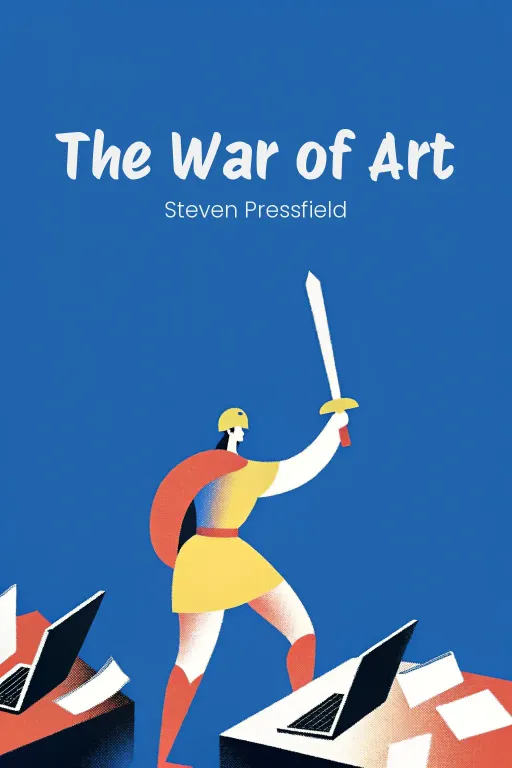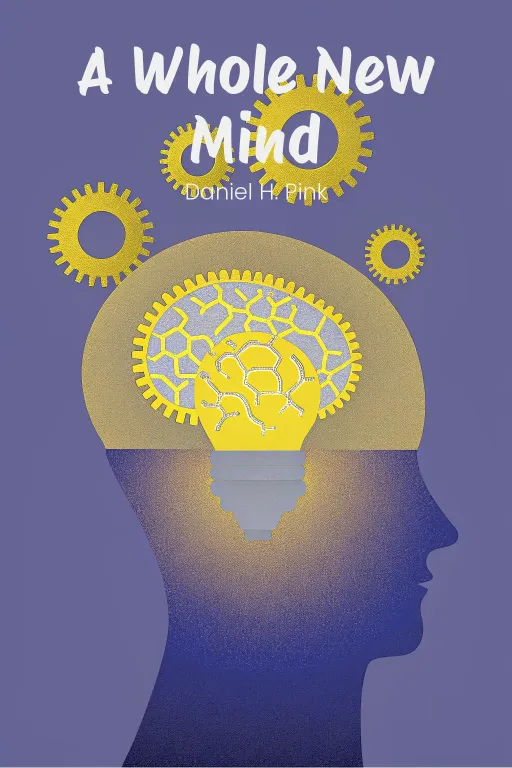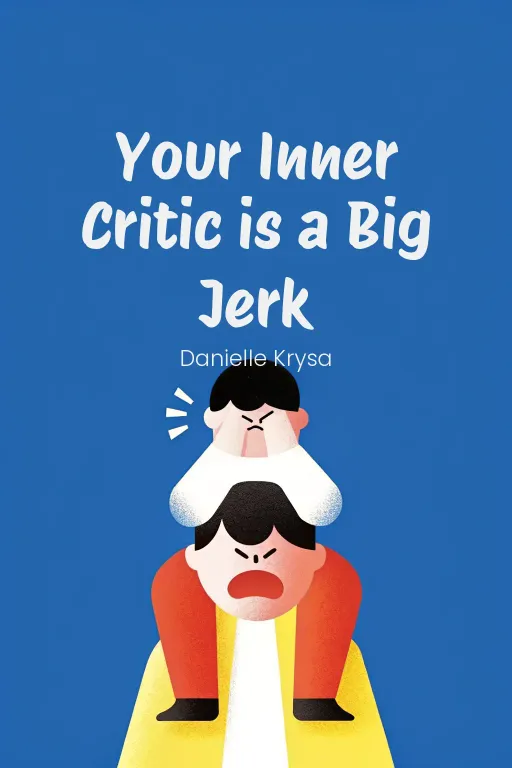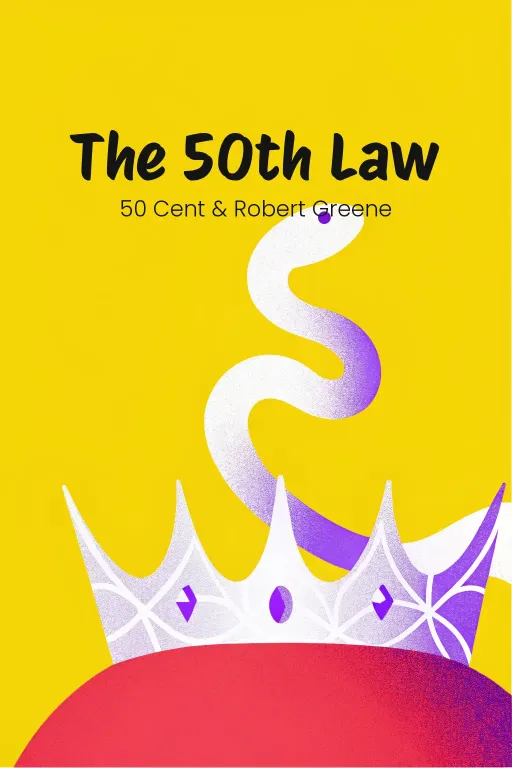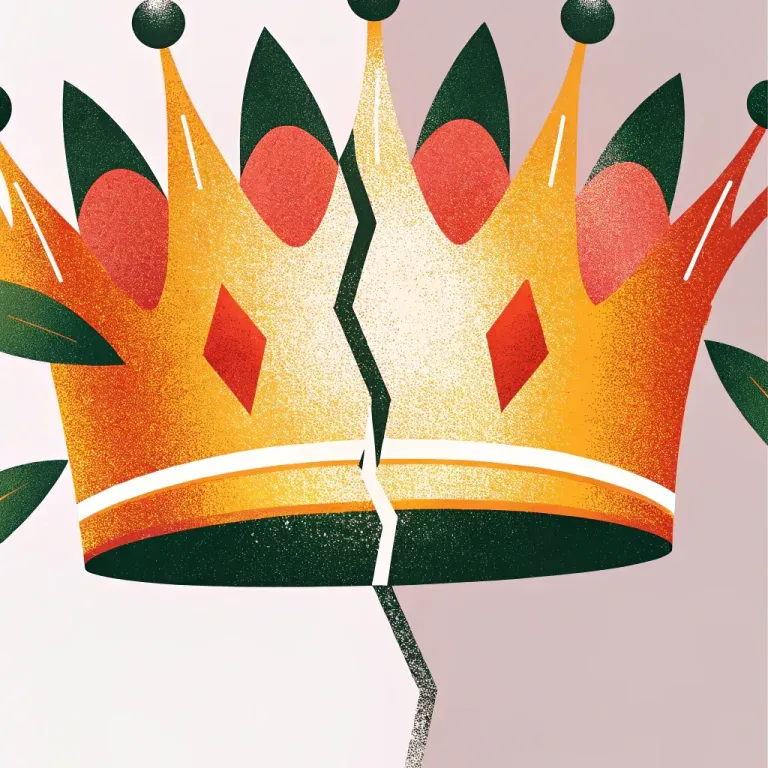
Fearless: Unlock Your Hidden Power
Podcast by Beta You with Alex and Michelle
50 Cent's Secrets to Fearlessness and Success
Introduction
Part 1
Alex: Hey everyone, welcome back! Today we're tackling a big one, something that really gets to the heart of what motivates us, or, you know, totally paralyzes us. Let me throw this out there: Imagine your life without fear calling the shots. What would you go after if you had absolute confidence every single time? Michelle: Whoa, bold start, Alex. But isn't fear kind of... baked in? I mean, it's a survival mechanism, right? So, it's not about if you feel fear; it's about how you handle it. And that perfectly sets the stage for the book we're diving into this week. Alex: Exactly! We're tackling The 50th Law by 50 Cent and Robert Greene. It's all about reframing fear, seeing it not as a roadblock, but as an opportunity to level up. Combining 50 Cent's life story, where being fearless was basically a survival skill, with historical examples, the book lays out ten principles for turning fear into a superpower. Think of it as part personal philosophy, part practical guide. Michelle: Okay, but let’s be real here. We're talking about a guy who survived getting shot multiple times, outmaneuvered record labels, and built a massive empire. It’s not exactly your average person's Tuesday, you know? So the big question is, how does this idea of fearlessness apply to our lives? The everyday stuff, the nine-to-five, the personal struggles? Alex: Great question, Michelle. And we’re going to answer that by breaking down five key themes from the book. First, we'll look at fearlessness as this incredible catalyst – how it basically wipes out self-doubt and ignites your ambition. Then, we’ll get into the nitty-gritty, the practical strategies for building resilience. After that, we're talking about the pursuit of mastery – how deliberate focus can turn your weaknesses into your greatest strengths. Michelle: Alright, but here’s where it gets interesting – point number four: mortality. How does facing the fact that life has an expiration date actually light a fire under you to take action? Then, we'll tie everything together with living authentically – using everything we've learned to design a life that's bold and driven by purpose. Alex: This is genuinely about transforming your perspective, seeing fear not as a cage, but as fuel. We will explore how to embrace the chaos, bet on yourself, and see making the fearless choice as something you can do every single day. Michelle: Perfect. Let’s cut through the hype and figure out how we can adapt The 50th Law into something practical, something we can actually use. Let’s get started.
Fearlessness as the Foundation of Success
Part 2
Alex: Okay, so picking up where we left off, let's really get into the meat of this: fearlessness. The book doesn't portray it as some lack of fear, right? More like building the “skill” to face it and, even better, move “past” it. It’s basically about changing how we react. Instead of letting it shut us down, we use it to see things more clearly and actually “do” something. Michelle: Right, I like how you put that – fear as something to be shaped, not erased. But let's be real, Alex: fear is primal. It's wired into us. I mean, how does the book deal with that? How can fearlessness be so essential for thriving? Alex: That's a great point. It really comes down to what fear “does” to us. When it's not in check, it kind of blinds us, locking us into these avoidance patterns. But, and here's the key, when we face it head-on, it broadens our awareness. Think of Abraham Lincoln. Leading a nation during the Civil War! Most people would be paralyzed. But Lincoln's tough upbringing, filled with hardship, pushed him to see things as they “were”, not as he wished they were. This clarity became his leadership foundation. Michelle: Hang on, Alex. Lincoln's cool, but isn't he a bit… exceptional? Not everyone comes from that level of adversity and ends up so pragmatic. Don’t most people just freeze when the stakes get that high? Alex: True, most people “do” freeze or just stick to the same old routine. Fear loves uncertainty. But Lincoln's genius wasn't just about guts; it was his ability to take in various perspectives and weigh them against reality. Like, many hesitated over the possibility of failure, right? But Lincoln leaned into the chaos. He was honest about the nation’s problems. And “that” allowed him to strategize, giving him clarity when others were hesitant. Michelle: Ah, so his fearless attitude wasn’t about being fearless in the moment itself–it was about preparing, seeing what was actually happening, and adapting. Now, how does someone apply this today? Imagine a regular person in a regular job, navigating office politics. How can they channel their inner-Lincoln, Alex? Alex: By developing what “The 50th Law” describes as "intense realism". Strip away the stories we tell ourselves, all the fantasy and wishful thinking, and really focus on what's “actually” happening. Let's think of 50 Cent for a moment, and his "hustler's eye". He grew up in a dangerous environment, and survival meant reading situations accurately. This heightened awareness helped him navigate both the streets and the music industry, right? Michelle: Okay, so you’re suggesting a street-hustler’s mindset in a corporate setting? I'm just trying to picture someone walking into a boardroom like it's Southside Queens or something. Alex: <Laughs> Not “exactly” like that, but there’s a lesson in pattern recognition. For 50, fearlessness meant understanding human behavior and using it to make calculated moves. Think about his pivot after being dropped by Columbia Records. Most would’ve just waited for another label. Instead, he used that rejection to his advantage, embracing his raw, unpolished vibe on mixtapes. And that gamble? It changed how artists build credibility. Michelle: Yeah, but it was a risk. If the mixtapes hadn't worked, he could've gone broke, even worse. So, it’s not like the actual feeling went away–he just used it as a signal to act, rather than freeze. Alex: Exactly. That's one of the book's key points: fear can be a roadblock or your GPS. The crucial thing is recognizing it as a sign that we’re pushing our comfort zone. And like you said, it’s not about erasing risk – it’s about stepping into it with your eyes wide open. Michelle: Which leads nicely into techniques. The book highlights two for tackling fear: embracing reality and taking decisive action. Let’s break these down. Starting with reality—what does that truly mean in practice? It’s easy to say, “Face the facts,” but harder to show how. Alex: It starts with letting go of our emotional biases. Fear distorts our view, so we avoid tough talks, ignore challenges, or exaggerate the risks. Embracing reality flips this. We start by asking, “What’s really happening here?” Lincoln did this during the Civil War, staying relentlessly honest about the challenges, rather than downplaying or romanticizing the situation. That’s what anchored his strategy. Michelle: Makes sense, but let’s be real—it takes some serious discipline to face reality when it’s overwhelming. To use the music industry as an example, how does someone “decide” to take decisive action when everything screams, "Play it safe!"? Alex: It comes down to practice and framing. 50 Cent wasn't reckless; his choices were calculated but bold. For example, instead of waiting for the industry to validate him, he released his voice as mixtapes, knowing some might flop, but seeing it as a way to control the narrative. Bold action neutralizes fear by giving you momentum. And when you move forward, even in small steps, you build resilience. Michelle: So, action isn’t just fighting fear–it’s a kind of inoculation against it. The more you do what scares you, the less power it has later on. I see how that feeds into the relationship between fearlessness and success—once fear becomes a “stepping stone,” you start seeing failure differently too. Alex: Exactly. That’s the heart of it all: fearlessness isn’t about never failing; it’s seeing failure as an inevitable – and necessary – step of reaching success. It’s turning fear into a creative force. Whether it's Lincoln, 50 Cent, or anyone facing a challenge, the core principle remains: fearlessness sharpens perspective, tempers resolve, and pushes us towards growth. Michelle: Alright, so we’ve got fear reframed as opportunity. Reality checks. Bold moves. Now, I'm wondering, how much of this is universal versus situational? Are there limits to how fearlessness can work depending on your circumstances?
Principles of Fearlessness
Part 3
Alex: That’s a fascinating question, Michelle, and it’s one the book indirectly addresses through its focus on adaptability. Okay, so let's dive into the first principle we’ll unpack: intense realism. This is foundational because it forces you to see things for what they are—stripping away illusions that, often, fear encourages us to cling to. I think this is universal because it’s not about specific circumstances; it’s about how you interpret your reality. Michelle: Okay, intense realism—facing the raw, unfiltered truth. But isn’t there a fine line between being intensely realistic and being paralyzed by pessimism? I mean, if all you see are the harsh realities of life, where does the motivation to act even come from? Alex: That’s a really good point, and the distinction lies in how you channel what you see, right? Intense realism isn’t about wallowing in negativity—it’s about clarity. Let’s go back to the case study of Abraham Lincoln during the Civil War. He didn’t shy away from the harsh truth of the nation’s deep divisions or the unimaginable cost of war. But instead of letting those truths overwhelm him, he used them as a framework for honest decision-making. Lincoln didn’t sugarcoat the stakes; he crafted strategies grounded in reality while still inspiring hope. So, his realism fueled decisive action. Michelle: Alright, I get that Lincoln had to deal with, oh, you know, a nation at war. But not everyone relates to being President in the middle of history’s bloodiest internal conflict. How does intense realism apply to, say, someone figuring out how to pay rent at the end of the month? Alex: The context may differ, but the principle remains the same. Whether you’re leading a nation or managing personal challenges, intense realism is about taking full stock of your position. Consider 50 Cent’s early career. He was shot nine times, dropped by Columbia Records, and blacklisted in the industry—a situation so bleak many would’ve given up. Instead, he examined his circumstances, identified his remaining options, and pivoted. By focusing on clear, actionable steps—like releasing raw, authentic mixtapes—he turned potential defeat into a launchpad for success. Michelle: So, you’re saying, step one is ditch the wishful thinking? No more daydreaming about problems magically solving themselves? Alex: Exactly. Wishful thinking is paralyzing. If you want to cultivate intense realism, the book recommends three actionable methods: first, observation without bias—analyzing situations without letting emotions cloud your view. Second, seeking diverse perspectives. Lincoln regularly consulted people who challenged his thinking, while 50 Cent relied on his “hustler’s eye” to assess people and trends. Lastly, auditing illusions. Regularly ask yourself: “What truths am I avoiding right now?” Whether it’s your career, finances, or relationships, it’s a practice that requires brutal honesty. Michelle: I can imagine that last one would sting. You think you’re doing okay, and then, bam, reality check: your safety net isn’t so safe. But I see how that’s also the wake-up call people need to act. Speaking of action, that brings us to self-reliance, doesn’t it? Alex: Exactly! Self-reliance is the next principle, and it builds on intense realism. Once you’ve stripped away the illusions, what do you do? You stop waiting for someone else to fix things and start owning every part of your journey. The book positions this as the cornerstone of independence—refusing to leave your future in anyone else’s hands. Michelle: Alright, let’s bring back 50 Cent here. His story is fearless, sure, but also wildly independent. After being abandoned by Columbia Records, he essentially went rogue with those mixtapes. Now, is self-reliance a mindset everyone can adopt? Because so much of success—even for 50, eventually—seems tied to collaborations and support structures. Alex: That’s precisely the nuance of self-reliance. It’s not about isolation; it’s about maintaining agency within collaborative dynamics. Look at 50 Cent’s mixtape campaign. It wasn’t that he ignored others—he sought out DJs and street networks to distribute his work—but he never handed over control. He produced, marketed, and owned the narrative every step of the way. Even when Eminem and Dr. Dre eventually partnered with him, he entered those deals from a position of power because he’d already proven his worth independently. Michelle: So, instead of waiting around for someone to champion your talents, you create undeniable proof of value—that’s what pulls collaborators or opportunities to you. Got it. But what does “self-reliance” mean for someone in more traditional careers, like teaching, accounting, or tech? Alex: It’s about ownership, Michelle. Start with your skills—you can’t outsource mastery. For example, 50 Cent invested in mastering his flow and lyrics before he ever stepped onto a big stage, even when that meant grinding in obscurity. Translate that to any profession, and the takeaway is similar: you build confidence and leverage by investing in your expertise. Then there’s decision-making—stop deferring to external validation. It’s like the book says: take responsibility for your outcomes. Whether successful or not, own them and learn. Michelle: Okay, that makes sense. But let’s tie this into fear. Fear does a number on people’s ability to trust themselves. So how do they even start feeling confident enough to build that self-reliance? Alex: Confidence comes through action, Michelle. Think about 50 Cent again—after the shooting, he didn’t wait around for another label to find him. Every mixtape he dropped was another step toward rebuilding his momentum. Self-reliance thrives on momentum. You start small, achieve small wins, build resilience—and over time, that silences the doubts. Michelle: So, we’re talking about momentum as the key to breaking down fear. But what about when momentum isn’t there—when you’re facing complete failure? That’s where opportunism comes in, doesn’t it? Alex: Right. Opportunism is the ability to reframe failure itself. This principle is all about resilience and adaptation—the ability to transform setbacks into stepping stones. Take 50 Cent’s album Power of the Dollar. It was set to launch his career before he got shot and Columbia dropped him. It sounds like game over, but he rewrote his entire narrative in recovery, incorporating his trauma into his music. That wasn’t just clever marketing—it was survival. Michelle: So failed opportunities aren’t the end of the road—they’re just new possibilities in disguise? Alex: Exactly. The book calls it “turning shit into sugar.” It’s about reframing challenges so they spark growth, creating tangible outputs, and staying flexible. When one door slams shut, fearlessness is about finding—or creating—a window.
Mastery and Patience
Part 4
Alex: So, with these principles in mind, let’s dive into how to actually “apply” them in mastering your environment. And that leads us to a crucial theme from The 50th Law: mastery and patience. It's not just about getting to the top; it's about building a solid foundation to get you “there”. We're talking practical strategies linked to some pretty deep philosophical insights about personal growth today. Michelle: Mastery and patience, huh? That's a tough sell these days, isn't it? We live in a world that practically “worships” instant gratification. "Overnight success" is practically a business model now. Alright, Alex, convince me: how do you make a case that mastery isn't just some… old-fashioned grind? Alex: Well, it's not about aimless grinding; it's about “depth”. Mastery is more than just putting in hours. It’s about really engaging with the process, embracing repetition, consistency, and even finding a way to thrive in what other people might call boring or monotonous. The book really nails this with historical and modern examples. Let's start with Isaac Newton. His story illustrates how downtime “doesn't” have to be wasted time. Michelle: Ah, yes, Newton. The guy who saw an apple fall and “poof,” discovered gravity. Short version, right? Alex: Close, but the real story is way more nuanced. In 1665, the Great Plague shut down Cambridge University, so Newton had to go back home. Now, most people would panic, get bored, or just kill time, but not Newton. He used that time for some seriously obsessive study. It's during this isolated period that he developed calculus, explored optics, and formulated his theory of gravity. It wasn’t just that one apple moment; it was months, even years, of dedicated focus on figuring out those universal truths. Michelle: So Newton is quarantining and basically turning his house into a lab. Easier said than done, right? Most of us would have gone completely stir-crazy within a week. What's the secret sauce that made Newton different? Alex: Two things really stood out: curiosity and patience. Newton was genuinely fascinated by the world's mechanisms. He wasn’t chasing accolades or quick wins; he was driven by “understanding”. Add that to his patience, and he saw isolation as, well, an opportunity, not an obstacle. Mastery needs that mindset – the ability to see potential even in less-than-ideal situations. But Newton’s just one example. Let’s talk about Michelangelo and what I call his “radical attention to detail”. Michelle: "Radical" is one way to describe a guy digging up corpses to paint prettier pictures. Remind me – what exactly was he up to there? Alex: He secretly dissected human bodies – a major taboo back then, by the way – to study anatomy. Other artists painted what they saw. Michelangelo wanted to understand the nitty-gritty of musculature and movement. All that painstaking work shows up in the unbelievable precision of his sculptures, like David, and his frescoes, like the Sistine Chapel ceiling. It wasn't “just” talent; it was years spent mastering every tiny detail, often facing harsh conditions or social judgment. Michelle: So, small details add up to the bigger picture. Got it. But dissecting bodies? That's feels pretty… extreme. Was that really necessary, or just a weird obsession? Alex: Necessary “for him.” That’s the point. Mastery sometimes demands discomfort. For Michelangelo, that was both physical and societal. He literally risked condemnation for his methods. But he truly believed that effort would elevate his art. Isn’t that the real takeaway? True mastery calls for doing the difficult, sometimes unpleasant work because that's the foundation of excellence. Michelle: Right, so Newton's quarantine, Michelangelo's dissection experiments… There's a pattern: these people didn't just work hard; they pushed boundaries. But what if I'm not exactly Newton or Michelangelo? How does this relate to us regular folks today? Alex: Well, 50 Cent gives us the modern blueprint. His journey to mastery isn't about a lab or Renaissance art; it's about survival and reinvention. After he was nearly killed in that shooting in 2000 and dropped by Columbia Records, he didn't rush back just to get back in the game. He slowed down to rebuild from the ground up, releasing mixtapes to hone his skills, test his audience, and really polish his voice. Michelle: So those mixtapes were his lab – like Newton's apple tree or Michelangelo’s, um, secret dissections. But also doubled as his first feedback loop, right? Alex: Exactly. He actively listened to the audience, how they responded. That iterative process gave him the insights he needed to grow authentically. And here's the cool part: by slowing down after the injuries, 50 Cent's voice actually changed – his delivery became more measured. What some might have written off as a drawback, he turned into a signature strength. That rasp wasn't just a remnant of trauma; it turned into an artistic trademark. Michelle: Got it – leveraging perceived weaknesses as strengths. But let’s be real, this guy also had to have resilience in order to just stick it out when record labels were ignoring him. I mean, others might've quit, but he took a slower, more intentional approach, right? Alex: Exactly. And that speaks to the patience aspect of mastery. This is active patience. It's about seeing setbacks, rejections, or even perceived weaknesses as tools to refine yourself and your craft. 50 Cent proved that mastery isn’t glamorous; it’s about grit. Michelle: Okay, so historical icons, iconic rappers—what's the connecting thread? How can someone today translate this slow-burn approach to mastery into something tangible, something they can “do”? Alex: The book highlights four specific tools, and they're just as relevant today as they've ever been. First, immersion in fundamentals—go back to the basics until they become second nature. Think of Michelangelo becoming intimately familiar with anatomy, or 50 Cent perfecting his verses. Second, integrate feedback loops—actively seek and embrace critique. Third, recognize that plateaus are “part” of the journey—Newton's intense grind didn’t produce instant findings, and breakthrough moments came later with persistence. Finally, deliberate practice - so you want to focus on very small, specific skills, then repeat until they’re nearly perfect. Michelle: Deliberate practice sounds … promising. And a little boring, too. One last push: does this even work across the board? In “any” field? Alex: It really can. The core principle stays the same, even if how you use it changes . The point is to shift away from the quick-reward mindset and embrace a long-term commitment. Whether you’re an artist perfecting the stroke of a brush or a teacher refining how they introduce a concept – mastery is about loving the process, flaws and all. Michelle: There we have it. Mastery isn’t about those big, flashy moments; it’s cumulative, deliberate, and, frankly, pretty unglamorous at times. But in today’s instant-gratification world, maybe slow and steady really does win the race.
Confronting Mortality
Part 5
Alex: So, this pursuit of mastery, it kind of naturally leads us to think about life and death, right? And the book goes into how facing mortality isn’t about, you know, being morbid, but about changing how we live. It's about seeing death not just as something that's gonna happen, but as, like, a reason to really live fully and fearlessly. It's a different way to look at time, what's urgent, and what actually means something to us. Michelle: Okay, Alex, here we go with the ultimate reality check. Are we saying that thinking about death is the secret to living our best lives? I can see that, but how does staring into the abyss “not” just make people more depressed? Alex: Right, I see what you mean. The thing is, it's about accepting it. When you sort of accept that death is, you know, part of life, a couple of things happen. First, it doesn’t scare you as much, and second, that acceptance makes you feel like you need to DO something. You start focusing on what really matters. Think about 50 Cent, right? After he was shot like nine times? Instead of being scared, he used it as a wake-up call. He said something like, "This could happen again at any time. I better hurry up and do what I want." Existential clarity, right there. Michelle: Nine bullets to redefine urgency... that’s hardcore. But come on, Alex, most of us don't get shot, thankfully. What’s the takeaway here for, you know, normal people? How do we get to that same point without nearly dying? Alex: Well, that's where thinking about things comes in. The book suggests making time to think about mortality. Journal about it, even. Not to get all hung up on dying but to figure out what’s important. Look at Ernest Shackleton, right? When his crew was stuck in Antarctica, death was everywhere. But he didn’t give up. He saw it as a test, found inspiration in a tough situation, and got his whole crew to safety. Death wasn’t just a danger for him -- it became a guide, helping him make good choices in the moment. Michelle: Shackleton's story is incredible, no doubt. But I worry that focusing too much on mortality could backfire. Isn't there a risk it'll just make people “more” anxious? Alex: That’s fair, but the book flips that around, and it's really interesting! It's about embracing the sublime, which is tied to philosophical ideas. Really thinking about death and that life is short can make you appreciate how amazing and huge life is. Like Kant said about standing in front of a mountain or staring at the ocean. Death isn’t just scary then, it's humbling. Reminds you how small you are, but also connects you to something bigger. Michelle: Okay, "standing before a mountain" works for Kant, sure. But for most of us, it sounds a bit abstract. I mean, it’s inspiring in theory, but how do you “practice” that on a regular day? Alex: You find things that change how you see the world. The book suggests spending time in nature something that makes you feel amazed. Could be art, music, or even a really good conversation with someone. These moments remind us how valuable life is, and help us put what's really important first, not fears. And then there's the writing down the question, "If I only had a year left, what would I change?" It forces you to think about what's truly important to you. Michelle: That last question is a good one. Simple, but powerful. A year left… suddenly your Instagram feed doesn’t seem so important. But what about people who feel stuck? How do you start changing what's important without being overwhelmed? Alex: One step at a time, Michelle. The book makes it simple. Start small, focus on relationships or things you love to do. And, really important, keep track of your time. We waste it on things that aren't important. Think about Curtis Jackson when he was shot. He didn't care about industry stuff anymore. Death made him focus on music, being creative, and leaving something important behind. Michelle: So, death isn’t just scary—it’s a guide to what's most important. But let’s flip this around. I liked how the book says that death unites us. Everyone is affected by death. Alex: Exactly! That's so important. Death is the one thing we all share. When you realize that, it changes how you connect with people. Things like money, status, don't matter as much. You see that we're all connected because we all have to face this. Curtis Jackson put it really well: “When the fear of death is gone, nothing can bother you and nobody can stop you.” It’s less isolating and more about finding common ground in being human. Michelle: Okay, so death gives us courage, perspective, and connection. That’s a lot to get from something most of us try “not” to think about. But you know what? It's starting to make sense. Death isn't just the end; it's the thing that makes us want to live fearlessly.
Inspired Living
Part 6
Alex: So, ultimately, this fearless path leads to what the book calls "inspired living." The 50th Law kind of brings together fearlessness, mastery, and, you know, accepting that we're all going to die someday, into this really compelling vision. It's about living authentically, taking action, and really zeroing in on what gives your life meaning. It's like, balancing the challenges life throws at you while staying true to yourself. Michelle: Okay, "inspired living" – a bold, purpose-driven life. But is this really a practical way to live, or just, you know, a nice idea? Getting rid of fear, becoming a master at something, and facing death – that all sounds great. But how does it actually work in the middle of our crazy, everyday lives? Alex: Well, that's where The 50th Law gets really interesting. It's not just some dream. It's got real, practical advice. Take fearlessness, for example. The book sees it as fuel – it’s the willingness to be vulnerable, to take chances, and to turn those uncertain moments into action. It's like, fear isn't a roadblock, it's a signpost pointing us towards where we need to grow or what we need to do. Michelle: That's empowering. But let’s look at 50 Cent's story from the book. He survived getting shot nine times and used it as a wake-up call. Most of us don't have something that extreme to shock us into focus. So, how can we become fearless without something dramatic happening to us? Alex: It begins with small steps. Fearlessness grows through action. Actually, the book has a great example: fear mapping. You identify your fears, break them down, and then tackle them one by one. It's not about suddenly facing your biggest fear head-on, but slowly getting used to it and building up your resilience. And take small calculated risks – speak up when you normally wouldn't, or try something new at work. That’s how you start changing how you react to fear. Michelle: Okay, so it’s not a quick fix, it’s a gradual change. That makes sense. Fearlessness isn't just blindly jumping into things, it's thinking strategically. And that's where mastery comes in, right? It’s the foundation for making lasting change. Alex: Exactly. Mastery is the opposite of just scratching the surface. It's where inspired living really takes root, because it's about committing to something bigger than instant gratification. The book emphasizes that mastery isn't glamorous. It's repetitive, sometimes frustrating, and often slow, but it changes you. Look at Isaac Newton. He didn't just invent the laws of motion overnight. He spent months alone during the plague, methodically working through physics, math, and optics. Michelle: Right, it’s about the work you don’t see. But how do we take these big stories – Newton, Shackleton, Michelangelo--and make them relevant to ordinary people today? I understand studying anatomy or working alone, but what’s the equivalent for someone starting a business or dealing with burnout? Alex: It's about starting where you are and focusing on small improvements. You don’t need to discover a new form of calculus, just tackle one little element of your field strategically. Think about 50 Cent again. After he was shot, he didn't immediately come back with huge plans. He rebuilt himself – those mixtapes were about finding his voice, testing his style, and slowly re-establishing himself. Every track was deliberate practice, and it was all building towards something bigger. Michelle: So mixtapes were his "laboratory,” like Newton’s isolation. Okay, but Newton and 50 Cent both had a kind of… forcing mechanism. Whether it was personal trauma or the plague. But what about people who are comfortable, just coasting along? How does mastery matter when there’s no real push to improve? Alex: Well, that's the challenge. Embracing mastery needs self-motivation. The book suggests deliberately stepping into uncomfortable situations that force you to learn and grow. Which ties directly back to fearlessness. Mastery flourishes when you leave your comfort zone, not when you wait for something to kick you out of it. For example, reviewing your daily routine or your goals can help point out areas that need some fresh impetus. Then, it’s all about small experiments – acquiring a skill, kicking off a project, or cracking a problem that holds personal value for you Michelle: I see how mastery and fearlessness connect now--it's about changing your mindset bit by bit over time. Which leads to the last aspect of inspired living: mortality. The book doesn’t let you avoid those big questions about life. So, how does thinking about death complete this picture? Alex: Mortality creates urgency. It helps us to focus. Once you accept that life is limited, you have to bring your actions in line with your values and ambitions. Think about Shackleton, watching his ship being crushed in Antarctica. Most people would just give up. But Shackleton used the certainty of death to rally his crew. His survival efforts weren't just about not dying. They were fueled by a deep appreciation for how fragile life is. Every choice he made was a deliberate defiance of giving up. Michelle: Shackleton was incredibly resilient, but mortality as a "motivator" feels a bit heavy, doesn’t it, Alex? How do ordinary people deal with this in a way that's empowering instead of, you know, depressing? Alex: It's about changing your perspective. Don't be afraid of death - use it to focus on what's most important in your life. The book suggests doing things like journaling about death, spending time in nature to feel humble and in awe, and regularly asking yourself, "If I only had a year left, what would I be doing?" These exercises help you stay grounded, so you can distinguish between what’s meaningful and what is just a distraction. Michelle: So facing mortality helps cuts through the noise, and the goal becomes gaining clarity. I also think it's important to remember that mortality connects us all. It's a shared experience that breaks down barriers. And that’s in line with the book’s message about connection – that inspired living isn't just about personal growth, but about real human relationships. Alex: Absolutely. When you drop the pretense and face the realities of life – like death – that vulnerability creates deeper, more compassionate connections. 50 Cent often talks about building bridges – whether cultural or personal – through honest storytelling. Even Jean de Léry—his time in Brazilian indigenous culture taught him that we all share a human side irrespective of our differences. Michelle: So, we're looking at the big picture, right? Fearlessness, mastery, mortality, and connection – all woven together into a life lived authentically and with purpose. Inspired living isn't about being perfect, it’s about fully embracing life. It feels both challenging and strangely within reach. Alex: Because it is. That’s actually the beauty of The 50th Law. It doesn’t provide easy answers or shortcuts. It offers a toolkit – a way to turn fear into motivation, to strive for mastery with persistence, and to live authentically, knowing that our time is limited. Michelle: Exactly. The fearless life isn't about getting rid of uncertainty, but embracing it, living with passion, and finding clarity. That’s inspired living, right there.
Conclusion
Part 7
Alex: Wow, what a ride through “The 50th Law” today! I mean, this book really challenges us to flip our whole perspective on fear, right? To see it not as something that holds us back, but as fuel for growth. We dove deep into how facing fear head-on sharpens our focus, how building mastery over time makes us super resilient, and how remembering that life is finite actually pushes us to live more authentically. Michelle: Exactly! And it's not just theoretical, is it? We're not just talking about historical figures or some music big shot like 50 Cent. These are real, practical ideas that anyone can use. Whether it's tackling the everyday grind or chasing a huge dream, it all comes down to changing how we see fear – from a dead end to a starting point. And then, committing to that long game of growth, and using the fact that life is limited as a reason to get moving, not to just give up. Alex: Precisely. So, here’s the challenge for everyone listening: pick one of the ideas we talked about today – maybe it’s about staring down a fear, or being patient, or even getting real with yourself about what matters most in your life. Just try to apply it in some small way. You might be surprised at the can of worms you open, in a good way. It could really snowball into something big. Michelle: Absolutely, and let’s be real, living fearlessly isn't about being perfect. It's about getting in the game. Embrace the awkwardness, learn when you screw up. Most importantly, put your energy into something that actually means something to you. Because as the book so clearly points out, being fearless is a choice we can all make. Alex: So, let's start making that choice, together! Let's stay bold, live authentically, and fearlessly chase our own inspired lives. Michelle: Exactly! To turning stress into action, and action into awesome. Until next time!





